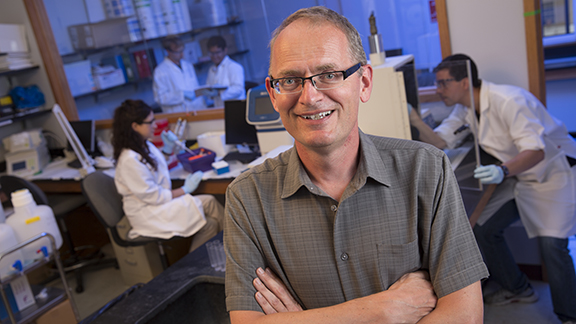
CEHS Receives Grand Challenges Explorations Grant for Research in Global Health and Development
30 Oct 2018
The University of Nebraska–Lincoln announced today that it is a winner of a Grand Challenges Explorations grant—an initiative funded by the Bill & Melinda Gates Foundation. Janos Zempleni, Willa Cather Professor of Molecular Nutrition and director of the Nebraska Center for the Prevention of Obesity Diseases through Dietary Molecules, will pursue an innovative global health and development research project, titled “Milk Exosomes and RNA for Optimal Growth and Immune Function.”
Grand Challenges Explorations (GCE) supports innovative thinkers worldwide to explore ideas that can break the mold in how we solve persistent global health and development challenges. Zempleni’s project is one of 34 Grand Challenges Explorations Round 21 grants announced by the Bill & Melinda Gates Foundation.
To receive funding, Zempleni and other Grand Challenges Explorations winners demonstrated in a two-page online application a bold idea in one of three critical global heath and development topic areas. The foundation will be accepting applications for the next GCE round in February, 2019.
Zempleni pioneered research in the field of milk exosomes and RNA cargos. Exosomes are natural nanoparticles that are present in all body fluids including human and animal milk. Exosomes transfer regulatory RNAs, important in the maintenance of optimal cell function, from donor cells to recipient cells. The unconventional idea of this proposal is that exosomes and their RNA cargos are obtained not only through endogenous biosynthesis but also from dietary sources such as milk; and milk exosomes contribute to the optimal development of babies. Milk exosomes and their RNA cargos are destroyed during the production of milk formulas, rendering milk formulas sub-optimal for supplying supplemental nutrition at weaning. Zempleni’s preliminary data suggest that there are major effects of milk exosomes and RNAs on child nutrition and health. 1) Postnatal growth lagged by 65% in mouse pups nursed by a dam that produced RNA-depleted milk compared to RNA-normal controls. 2) When mice were fed an exosome- and RNA-depleted (ERD) solid diet and challenged with influenza A virus, pups died within 11 days of viral challenge. In contrast, 100% of pups fed an exosome- and RNA-sufficient (ERS) diet survived.
Zempleni is Willa Cather Professor or Molecular Nutrition and director of the Nebraska Center for the Prevention of Obesity Diseases through Dietary Molecules at the University of Nebraska–Lincoln. His laboratory has 20+ years of experience in nutrient signaling and its roles in human disease. Gene regulation by epigenetic mechanisms and non-coding RNAs has been of particular interest to his research team. Studies of dietary microRNAs are currently the exclusive research focus in the Zempleni laboratory, using cell culture, human and animal models. The Zempleni lab has been continuously funded by NIH, USDA/NIFA, NSF and various foundations and external sources since 2001.
For more information about this and other grant announcements, visit https://go.unl.edu/wqmx.
About Grand Challenges Explorations
Grand Challenges Explorations is a US$100 million initiative funded by the Bill & Melinda Gates Foundation. Launched in 2008, over 1,400 projects in more than 65 countries have received Grand Challenges Explorations grants. The grant program is open to anyone from any discipline and from any organization. The initiative uses an agile, accelerated grant-making process with short two-page online applications and no preliminary data required. Initial grants of US$100,000 are awarded two times per year. Successful projects have the opportunity to receive a follow-on grant of up to US$1 million.
More details at: https://go.unl.edu/wqmx
College of Education and Human Sciences
Nutrition and Health Sciences